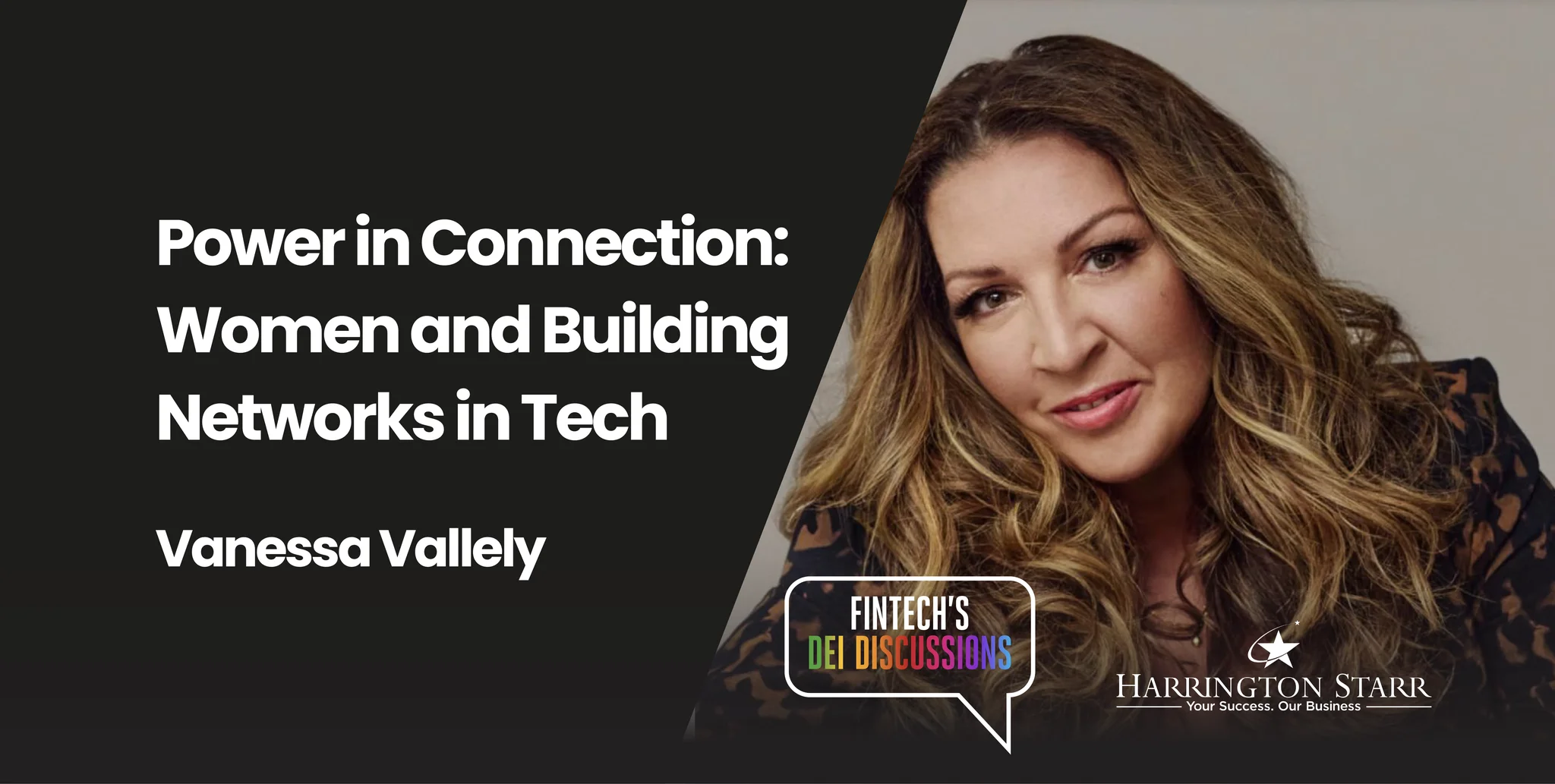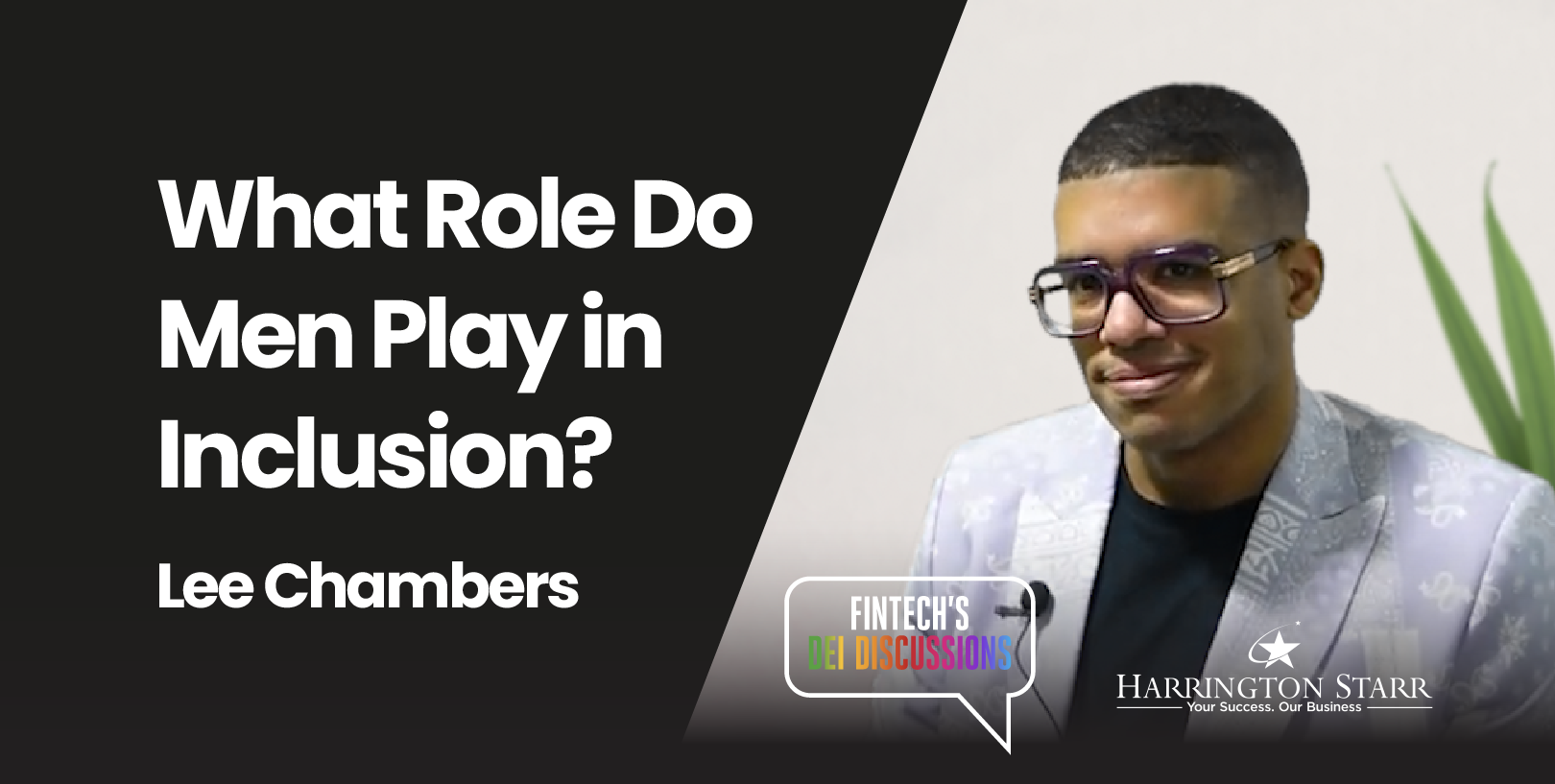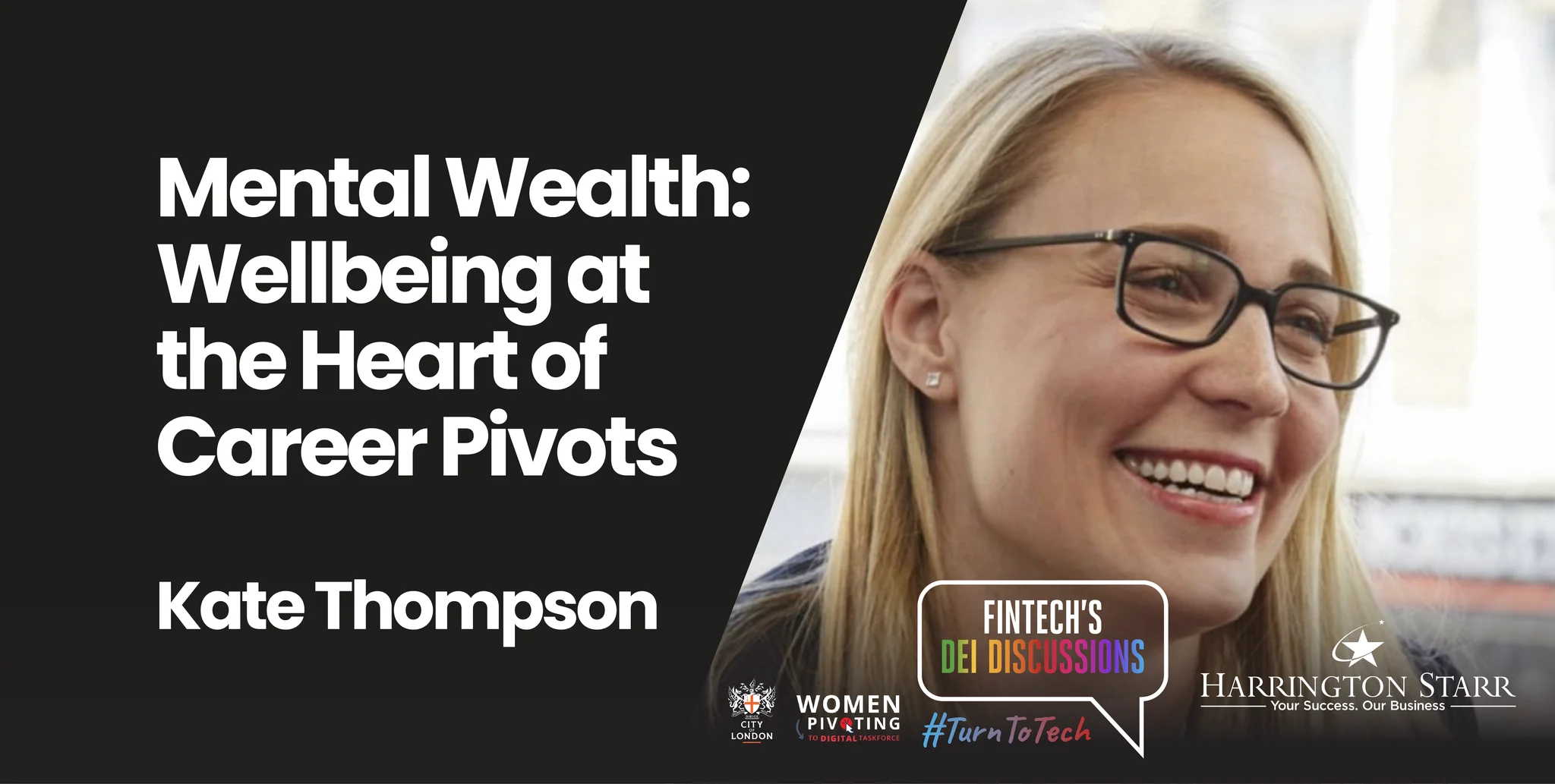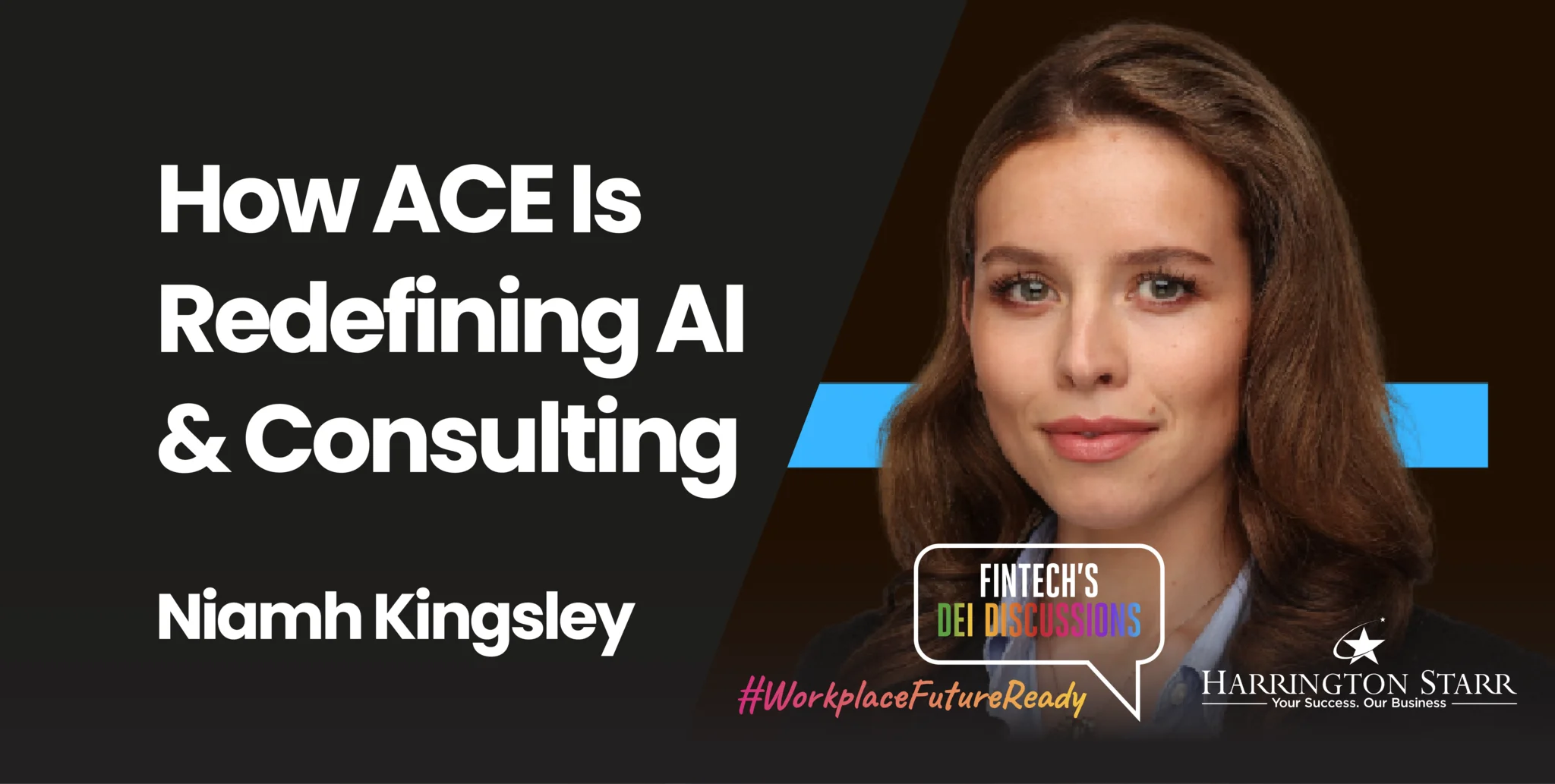
Is Allyship the Missing Link to True Workplace Inclusion?
In the latest episode of FinTech’s DEI Discussions, Nadia sits down with Lee Chambers, CEO of Male Allies UK, for a thought-provoking conversation on what real allyship looks like in today’s workplaces. The discussion moves beyond surface-level DEI initiatives and explores how true inclusion comes from small, intentional actions. Lee shares his journey into founding Male Allies UK, the challenges men face when engaging in inclusion efforts, and why businesses must create workplaces where diversity isn’t just a talking point but a reality. As a FinTech recruitment business, we at Harrington Starr understand the importance of inclusive hiring and workplace culture, and this episode is a powerful call to action for the industry.
A Personal Journey to Allyship
Lee Chambers’ journey to founding Male Allies UK is deeply personal. With a career spanning 20 years, he initially worked in corporate finance before pivoting into tech entrepreneurship. Having built and scaled a business in e-commerce, software, and fulfilment, he gained firsthand experience in leadership, team dynamics, and the challenges of running a company. However, his perspective shifted dramatically when a sudden illness left him unable to walk. After a year-long recovery, he reassessed his life and career, ultimately deciding to step back from the C-suite to become a full-time father. This decision led to a profound realisation when he walked into a local baby and toddler group—he was the only father in the room.
Experiencing this level of isolation firsthand made him more aware of the societal expectations and biases that shape gender roles. It wasn’t just the awkwardness of standing out in a space traditionally occupied by mothers and grandmothers—it was the way people reacted. Some praised him for stepping up, while others dismissed it as career suicide. These experiences sparked a curiosity that would eventually lead him to gender equity, workplace inclusion, and allyship.
Why Men Need to Be Part of the Inclusion Conversation
A key theme of the episode is the role of men in inclusion—a topic that is often overlooked or poorly communicated. Lee points out that inclusion efforts have historically failed to engage men effectively. This lack of engagement is not always due to disinterest but rather a failure in how these initiatives are marketed and framed. Men, like women, face challenges in society, particularly around mental health, social isolation, and workplace well-being. While there is an undeniable gender gap in many industries, the solution isn’t about pitting one group against another—it’s about collaboration.
Lee stresses that many men want to be part of the inclusion movement but don’t know where to start. The fear of saying the wrong thing or making mistakes often holds them back. He argues that true allyship isn’t about grand gestures but about small, consistent actions. Whether it’s amplifying underrepresented voices in meetings, acknowledging contributions, or challenging bias when they see it, these actions accumulate to create inclusive workplaces.
Allyship as a Skill for the Future of FinTech
One of the most compelling points Lee makes is that allyship is a skill—one that can and should be developed just like any other professional competency. As businesses evolve, and technology like AI and automation reshapes the workforce, the human skills that set us apart will become even more valuable. The ability to work effectively with diverse teams, navigate complex social dynamics, and foster inclusive cultures will be crucial for leaders, hiring managers, and employees alike.
He makes an interesting comparison to leadership language, noting how much of today’s corporate terminology is rooted in military strategy. Words like “battlefield,” “hierarchy,” and “command” shape how workplaces operate, often reinforcing a top-down, competitive culture. But inclusion isn’t about winning a war—it’s about building bridges. Allyship, in its truest form, means uniting people, leveraging different perspectives, and driving innovation through diversity.
Turning Intentions into Actionable Inclusion in Financial Technology
For many organisations, DEI initiatives have been well-intended but ineffective. Lee and Nadia discuss how companies often invest in programmes without properly integrating them into their culture or measuring their impact. One example is women’s leadership programmes—while these are valuable, they are sometimes perceived as exclusionary if the purpose isn’t clearly communicated to the broader workforce.
True inclusion requires more than just awareness campaigns or diversity training sessions. It’s about embedding inclusive practices into everyday business operations. Lee suggests that companies start by identifying and removing barriers in hiring, promotion, and leadership opportunities. Simple actions, like ensuring everyone gets credit for their contributions or making networking events more accessible, can have a profound impact on workplace culture.
Listening to Understand: The Key to Inclusive Leadership in FinTech
Throughout the conversation, one message stands out: the power of listening. Lee shares that one of the most effective ways to become a better ally is to start listening to learn, rather than to respond. Many workplace issues stem from a lack of understanding rather than malice. Leaders who take the time to listen—whether in meetings, mentoring relationships, or casual conversations—can drive meaningful change simply by acknowledging different experiences.
Nadia reinforces this by noting how active listening is crucial in inclusion work. People often dismiss concerns because they don’t directly experience them, but that doesn’t mean they aren’t real. By fostering a culture where employees feel heard and valued, businesses can create a stronger, more engaged workforce.
The Business Case for Allyship in FinTech
For those in FinTech, financial services, and technology recruitment, allyship isn’t just a social responsibility—it’s a business imperative. A diverse and inclusive workforce is more innovative, more productive, and better positioned to serve an increasingly global client base. At Harrington Starr, we’ve seen firsthand how companies that prioritise inclusive hiring and diverse leadership teams outperform their competitors. Inclusive teams bring different perspectives, challenge groupthink, and drive creative problem-solving, all of which are critical in an industry that thrives on disruption and innovation.
Lee highlights that as technology advances, the demand for strong people skills will rise. Businesses that invest in inclusive leadership today will be better prepared for the future of work. More importantly, employees who develop these skills will find themselves at a competitive advantage in an increasingly tech-driven workforce.
Where Do We Go From Here?
As the episode concludes, Lee offers a simple yet powerful piece of advice: start small. You don’t need to overhaul your entire company overnight. Instead, begin by engaging in conversations, challenging your own biases, and making intentional efforts to include others. Read a book by an author from a different background. Watch a TED Talk from someone with a different lived experience. Step outside your algorithm and expose yourself to new perspectives.
For businesses, the challenge is to ensure that inclusion isn’t just a box-ticking exercise. It should be woven into the fabric of how organisations hire, promote, and lead. At Harrington Starr, we’re committed to not only helping FinTech companies recruit top talent but also ensuring that those workplaces are ones where everyone can thrive.
Final Thoughts
This episode of FinTech’s DEI Discussions is a must-listen for leaders, hiring managers, and professionals who want to go beyond performative allyship and create real change. Lee’s insights are a reminder that inclusion isn’t about taking space away from anyone—it’s about making sure everyone has a seat at the table.
This episode conversation is directly relevant to Harrington Starr as a FinTech recruitment company, as it highlights the critical role of workplace inclusion in shaping the future of financial technology. Recruitment is not just about filling roles—it’s about ensuring that companies attract, retain, and develop diverse talent in a way that fosters innovation, collaboration, and long-term success.
At Harrington Starr, we have seen first-hand how companies that prioritise diverse hiring and inclusive workplace cultures outperform those that don’t. As FinTech continues to evolve, businesses that invest in allyship, diversity, and equity will not only build stronger teams but also create environments where talent thrives. Lee’s insights reinforce the importance of embedding inclusion into recruitment strategies, ensuring that businesses don’t just hire diverse candidates but actively support their career progression and create equitable opportunities for all employees.
The episode also ties into the challenges the FinTech sector faces—whether it’s the lack of gender diversity in leadership, barriers to entry for underrepresented groups, or the need for better engagement in DEI initiatives. As specialists in FinTech recruitment, we help companies build teams that reflect the world they serve, ensuring hiring processes are inclusive, talent strategies align with industry needs, and leaders are empowered to foster diverse workplaces.
By amplifying conversations like these, Harrington Starr continues to lead the way in ensuring that the FinTech industry walks the talk when it comes to diversity, equity, and inclusion in hiring and beyond.





